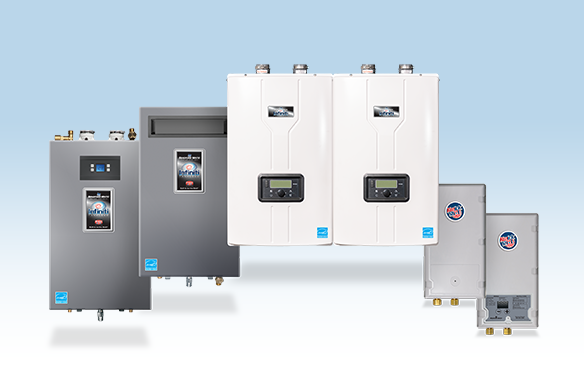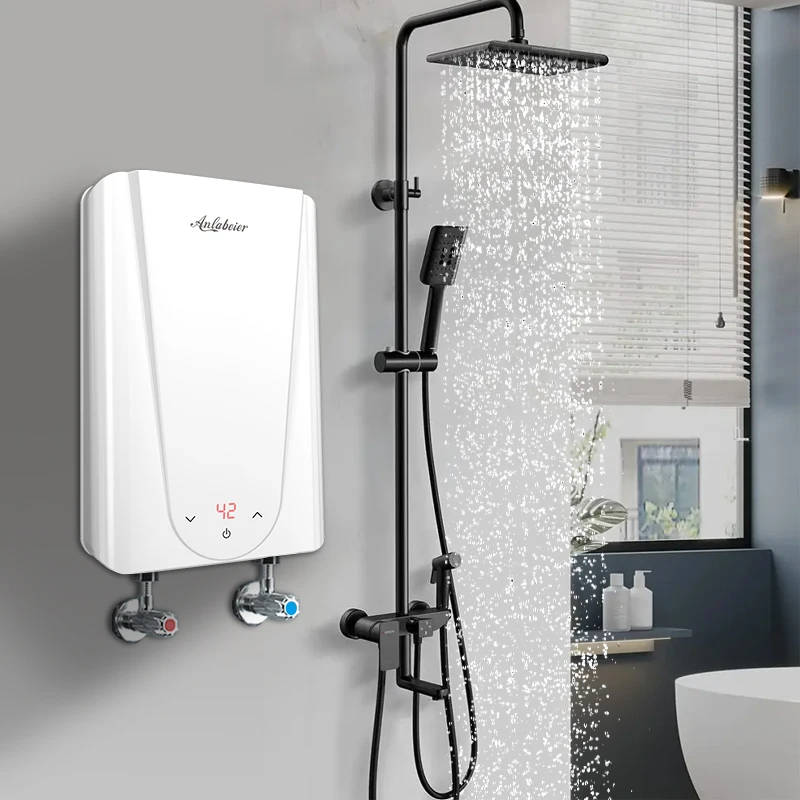We've encountered this post pertaining to Six Benefits of a Tankless Hot Water Heater listed below on the internet and thought it made perfect sense to write about it with you on this page.

In a world where benefit and performance reign supreme, it's not a surprise that property owners are frequently looking for smarter methods to manage their home's power usage and comfort. One development that has continuously obtained appeal is the tankless hot water heater. Yet just what makes these systems attract attention from the standard tank-based designs a lot of us grew up with? Allow's dive in and explore the benefits of tankless water heaters, helping you decide if it's time to make the switch in your home.
Intro
Picture this: you enter the shower after a lengthy day, anticipating a soothing waterfall of warm water, just to be greeted by icy beads due to the fact that the last individual utilized it all up. Sound familiar? Typical hot water heater store a fixed quantity of warm water, suggesting you're at the mercy of that tank's supply. Tankless systems, on the other hand, warmth water on demand. No more going out mid-shower, no more fumbling with schedules simply to make certain hot water is readily available.
Understanding Tankless Hot Water Heater
What Are Tankless Hot Water Heater?
Tankless water heaters, occasionally known as on-demand or instantaneous hot water heater, give hot water only as it's required. As opposed to storing gallons of pre-heated water, these units kick into action the moment you turn on the tap. Water goes through a warm exchanger, warming up in real-time, suggesting you obtain an uninterrupted flow of hot water without the demand for a huge tank sitting idly by.
Exactly how Do They Vary from Traditional Equipments?
Typical heating systems hold a storage tank of warm water, using power to keep that tank at a consistent temperature. Tankless units remove the standing supply, minimizing lost energy and the large impact of a huge cylinder. Basically, you're updating from a "accumulation" state of mind to a "made-to-order" method.
Usual Types of Tankless Systems
Tankless water heaters normally are available in two varieties: gas and electric. Gas models often tend to provide greater flow prices, ideal for bigger houses, while electrical versions commonly offer smaller sized homes and are usually less complicated to set up. Additionally, some systems are developed for point-of-use (serving one fixture) while others can take care of the entire home's warm water requirements.
Trick Benefits of Tankless Hot Water Heater
Power Efficiency and Cost Savings
Say goodbye to heating a titan tank's well worth of water and keeping it warm all the time. Tankless heaters lower standby energy losses, which can decrease utility bills. While the first cost could be greater, the lasting financial savings frequently justify the investment.
3. Space-Saving Style
If your home is short on storage space, eliminating the cumbersome storage tank frees up useful room. Tankless units are small and can often be installed on walls, stashed in edges, or set up in limited energy storage rooms without hogging the whole space.
4. Longer Life-span
A well-kept tankless hot water heater can outlive its tank-based relative. Conventional storage tanks could last 10-15 years, while tankless versions can maintain downing along for two decades or more, making them a strong financial investment in time.
1. Endless Warm Water Supply
Ever needed to arrange showers so everyone obtains their fair share of hot water? With tankless, that ends up being a distant memory. As long as the heater's flow capacity isn't exceeded, you can take back-to-back showers without turning into a popsicle.
5. Improved Water Quality
Storing water in a container can in some cases bring about debris accumulation or a slightly "off" preference. With tankless systems, fresh water is heated right away, decreasing the opportunities of sediment buildup and potentially using cleaner-tasting water.
Considerations Before Changing
Though the benefits are engaging, it's a good idea to think about a few aspects prior to completely dedicating.
Assessing Your Home's Water Use Patterns
If your home concurrently utilizes multiple fixtures with high hot water need, see to it the unit's flow price fulfills your needs. Recognizing your use patterns helps you choose the ideal dimension and sort of tankless heater.
Maintenance and Care Tips
Tankless systems are reasonably low maintenance, yet they aren't set-it-and-forget-it home appliances.
Regular Cleaning and Descaling
Hard water minerals can build up in the warmth exchanger, impacting effectiveness. Routine descaling (usually suggested yearly) keeps the device running at peak performance.
Annual Expert Inspections
A yearly checkup from an expert makes certain minor problems are captured early. They'll assess the system's efficiency, try to find leakages, and help keep optimal performance.
First Financial Investment Prices
Tankless heaters commonly come with a greater upfront price tag. Between the unit itself and prospective setup alterations, the preliminary expense might provide you sticker shock. Yet keep in mind to watch it as a long-term investment.
Installment Requirements
Relying on your home's framework, you may require additional electric ability or gas line upgrades. Guarantee you recognize the setup demands and consult with a professional to stay clear of shocks.
Guaranteeing Proper Ventilation
For gas models, correct ventilation is necessary to securely remove exhaust gases. Ensure airing vent systems are clean and appropriately set up to stop any kind of prospective safety dangers.
Contrasting Different Brands and Versions
Not all tankless water heaters are produced equivalent.
Researching Trustworthy Manufacturers
Search for reputable brand names with a background of producing top quality devices. A trusted supplier often gives far better customer assistance and longer warranties.
Installment: DIY or Professional?
While some home owners delight in taking on jobs themselves, tankless installation might not be the very best time to burst out the tool kit.
Advantages and disadvantages of Do It Yourself Setup
A do it yourself install might conserve money, however it comes with dangers. Incorrect installment can bring about inadequacy or safety and security concerns. If you come in handy and have experience, it could be feasible-- yet wage caution.
Reading Reviews and User Feedback
Customer reviews and feedback from neighbors or good friends who have actually gone tankless can use important insights. In some cases, real-life experiences can be extra informing than advertising and marketing brochures.
When to Call a Specialist Plumber
For most, calling a pro makes sure whatever's done appropriately. A specialist plumbing comprehends regional codes, sizing needs, and venting specifications, minimizing the danger of incidents.
Making best use of Efficiency
You've invested in a tankless unit-- now optimize its efficiency.
Ideal Temperature Settings
Lots of people set their systems between 120-140 F. Readjusting the temperature can enhance comfort and savings. Experiment to discover a wonderful area that doesn't waste power.
Coupling With Low-Flow Fixtures
Want to extend your device's capacities? Think about mounting low-flow showerheads and faucets. They reduce water usage, permitting your tankless system to provide a constant stream of hot water without stressing.
Environmental Impact
Tankless water heaters align with greener living objectives.
Reduced Carbon Impact
By utilizing much less power and only heating water as required, tankless systems can reduce your home's carbon footprint, reducing your ecological effect.
Saving Natural Resources
Less energy consumption and much less lost warm water equate into fewer natural deposits being made use of, an ecological win-win.
Who Profits Most from Tankless Heaters?
The charm of tankless heating units is that they can suit a variety of houses.
Big Families vs. Solitary Passengers
Large households might enjoy the unlimited warm water supply, while solitary occupants value the power financial savings from not warming a whole storage tank for just someone's morning shower.
Home Owners with Restricted Space
If your home is short on square footage, losing the bulky storage tank liberates area for various other basics-- or possibly just extra elbow room.
Eco-Conscious Customers
Going tankless aligns with environmentally friendly values, ensuring you're not losing energy or sources.
Future Fads in Tankless Water Heaters
The globe of home appliances is ever-evolving, and tankless hot water heater are no exception.
Innovations in Modern technology
R&D is regularly enhancing heat exchangers, making devices more effective and sturdy. Future versions could be also quieter, extra portable, and far better matched for varying climates.
Smart Home Integration
Visualize adjusting your hot water heater's temperature level via an application or getting upkeep signals on your phone. As wise home tech advances, we'll see more connectivity and comfort.
Final thought
Selecting a tankless water heater is greater than simply upgrading your home's hot water system; it's buying long-term convenience, energy performance, and a greener way of living. By considering your house's water use, being mindful of installation requirements, and devoting to regular upkeep, you can appreciate a constant stream of hot water without the baggage of a cumbersome storage tank. As innovation develops, you can eagerly anticipate also smarter, a lot more reliable tankless options that not just make your life much easier however additionally profit the world.
Why You Should Consider a Tankless Water Heater for Your Home
Energy Efficiency and Cost Savings
Tankless water heaters, also known as on-demand water heaters, heat water only when needed. This means they don't waste energy keeping a tank of water hot constantly. This efficiency translates into substantial cost savings on your monthly energy bills.
Endless Hot Water Supply
One of the significant advantages of tankless water heaters is their ability to provide a continuous supply of hot water. Traditional tank water heaters have a limited capacity and can run out of hot water, especially during peak usage times. In contrast, tankless water heaters can provide an endless stream of hot water, making them ideal for larger families or homes with high water usage.
Space-Saving Design
Tankless water heaters are compact and take up significantly less space compared to traditional tank heaters. They can be installed on walls, under cabinets, or even outside, freeing up valuable space in your home. This makes tankless water heaters a great option for smaller homes or properties with limited space for a traditional water heater.
Longer Lifespan and Lower Maintenance
Tankless water heaters typically have a longer lifespan compared to traditional tank heaters. They can last up to 20 years or more with proper maintenance. Additionally, tankless systems are designed with replaceable parts, which can extend their lifespan further and reduce long-term maintenance costs.
Environmentally Friendly
Reducing energy consumption not only saves you money but also benefits the environment. Tankless water heaters contribute to a smaller carbon footprint by using less energy to heat water. Their energy efficiency and ability to minimize standby heat loss make them an eco-friendly choice for environmentally conscious homeowners.
Customized Temperature Control
Tankless water heaters offer precise temperature control, allowing you to set the desired temperature to meet your specific needs. This level of customization ensures you always have water at the perfect temperature for your comfort and usage requirements.
https://beantownservices.com/blog/consider-tankless-water-heater-for-your-home

Do you really like reading about Six Benefits of a Tankless Hot Water Heater? Place a remark down below. We would be glad to know your reactions about this write-up. In hopes to see you back again before long. In case you liked our post kindly remember to share it. Thank-you for taking the time to read it.
Click Here!